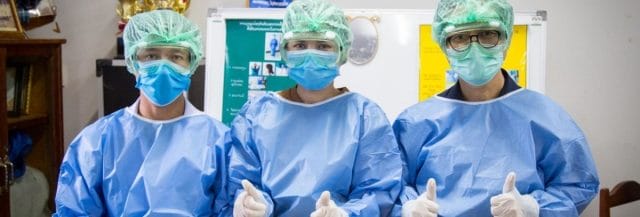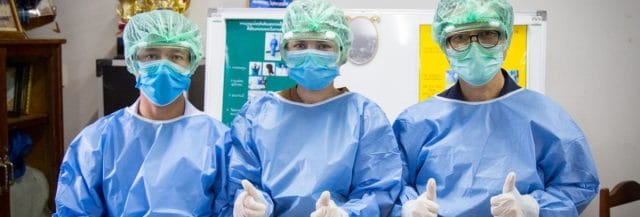WHO and partners call for action to better protect health and care workers from COVID-19

The World Health Organization and partners[i] have issued an urgent call for concrete action to better protect health and care workers worldwide from COVID-19 and other health issues.
The organizations are concerned that large numbers of health and care workers have died from COVID-19, but also that an increasing proportion of the workforce are suffering from burnout, stress, anxiety and fatigue.
In a Joint Statement issued this week, WHO and partners are calling on all Member State governments and stakeholders to strengthen the monitoring and reporting of COVID-19 infections, ill-health and deaths among health and care workers. They should also include disaggregation by age, gender and occupation as a standard procedure, to enable decision makers and scientists to identify and implement mitigation measures that will further reduce the risk of infections and ill-health.
The Statement also urges political leaders and policy makers to do all within their power to make regulatory, policy and investment decisions that ensure the protection of health and care workers. It highlights the opportunity to align this with a forthcoming global health and care worker compact and the International Labour Organization’s call for a human-centered recovery from the COVID-19 crisis.
Finally, the partners call upon leaders and policy makers to ensure equitable access to vaccines so that health and care workers are prioritized in the uptake of COVID-19 vaccinations. Available data from 119 countries suggest that by September 2021, 2 in 5 health and care workers were fully vaccinated on average, with considerable difference across regions and economic groupings. Less than 1 in 10 have been fully vaccinated in the African region while 22 mostly high-income countries reported that above 80% of their health and care workers are fully vaccinated. These rates only account for data reported to WHO through the standard mechanisms.
“We have a moral obligation to protect all health and care workers, ensure their rights and provide them with decent work in a safe and enabling practice environment. This must include access to vaccines”, said Jim Campbell, Director of the WHO Health Workforce Department. “Beyond vaccines , economic recovery and all new investments in emergency preparedness and response must prioritize the education and employment of health and care workers, linking to the UN Secretary-General’s Global Accelerator for Jobs and Social Protection,” he added.
A new WHO working paper estimates that between 80 000 to 180 000 health and care workers could have died from COVID-19 in the period between January 2020 to May 2021, converging to a medium scenario of 115 500 deaths. These estimates are derived from the 3.45 million COVID-19 related deaths reported to WHO as at May 2021; a number by itself considered to be much lower than the real death toll (60% or more than what is reported to WHO).
“This WHO working paper provides a stark number to stimulate greater action; we cannot afford to lose more health and care workers and our world will not recover from the pandemic without long-term, sustainable investments in the health workforce,” said Catherine Duggan, Chief Executive Officer of the International Pharmaceutical Federation and one of several members of the World Health Professions Alliance allied with the Joint Statement.
WHO is currently leading efforts to develop a global health and care worker compact, based on existing legal instruments, conventions and resolutions. The compact aims to provide Member States, stakeholders and institutions with comprehensive guidance on their existing obligations to protect health and care workers, safeguard their rights, and to promote and ensure decent work, free from gender, racial and all other forms of discrimination. The guidance will be presented to the 75th World Health Assembly in May 2022.
[i] Frontline Health Workers Coalition; Global Health Workforce Network; Health Service Executive, Ireland; International Council of Nurses; International Pharmaceutical Federation; International Labour Organization; OECD; Public Services International and the World Medical Association.

